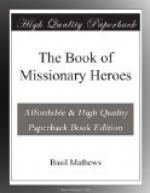Abdallah the Daring
In Kabul there was an Armenian whose name we do not know: but he owned a book printed in Arabic, a book that Abdallah could read. The Armenian lent it to him. There were hardly any books in Arabic, so Abdallah took this book and read it eagerly. As he read, he thought that he had never in all his life heard of such wonderful things, and he could feel in his very bones that they were true. He read four short true stories in this book: they were what we call the Gospels according to Matthew, Mark, Luke and John. As he read, Abdallah saw in the stories Someone who was infinitely greater than Mohammed—One who was so strong and gentle that He was always helping children and women and people who were ill; so good that He always lived the very life that God willed; and so brave that He died rather than give in to evil men—our Lord Jesus Christ.
“I worship Him,” said Abdallah in his heart. Then he did a very daring thing. He knew that if he turned Christian it would be the duty of Mohammedans to kill him. Why not keep quiet and say nothing about his change of heart? But he could not. He decided that he must come out in the open and confess the new Captain of his life. He was baptized a Christian.
The Moslems were furious. To save his life Abdallah fled on his camel westward to Bokhara. But the news that he had become a Christian flew even faster than he himself rode. As he went along the streets of Bokhara he saw his friend Sabat coming toward him. As a friend, Sabat desired to save Abdallah; but as a Moslem, the cruel law of Mohammed said that he must have him put to death. And Sabat was a fiery, hot-tempered Moslem.
“I had no pity,” Sabat told his friends afterward. “I delivered him up to Morad Shah, the King.”
So Abdallah was bound and carried before the Moslem judges. His friend Sabat stood by watching, just as Saul had stood watching them stone Stephen nearly eighteen centuries earlier.
“You shall be given your life and be set free,” they said, “if you will spit upon the Cross and renounce Christ and say, ’There is no God but Allah.’”
“I refuse,” said Abdallah.
A sword was brought forward and unsheathed. Abdallah’s arm was stretched out: the sword was lifted—it flashed—and Abdallah’s hand, cut clean off, fell on the ground, while the blood spurted from his arm.
“Your life will still be given you if you renounce Christ and proclaim Allah and Mohammed as His prophet.”
This is how Sabat himself described what happened next. “Abdallah made no answer, but looked up steadfastly toward heaven, like Stephen, the first martyr, his eyes streaming with tears. He looked at me,” said Sabat, “but it was with the countenance of forgiveness.”
Abdallah’s other arm was stretched out, again the sword flashed and fell. His other hand dropped to the ground. He stood there bleeding and handless. He bowed his head and his neck was bared to the sword. Again the blade flashed. He was beheaded, and Sabat—Sabat who had ridden a thousand miles with his friend and had faced with him the blistering sun of the desert and the snow-blizzard of the mountain—saw Abdallah’s head lie there on the ground and the dead body carried away.




